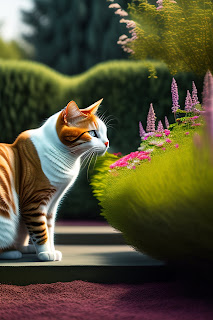Why My Cats Sometimes Love Bite And Eating Grass
Why is Your Cat Eating Grass?
Have you ever pondered the curious behavior of your feline friend nibbling on blades of grass? Perhaps you’ve returned home to the unpleasant sight of a half-digested green mess adorning your pristine sofa. Quite the unwelcome surprise!
But what motivates cats to indulge in this peculiar habit, and why do they seemingly prefer to regurgitate it in the most inconvenient of places? Is it detrimental to their well-being?
If you’re eager to uncover the mysteries behind your cat’s grass-eating tendencies or simply yearn for a glimpse of some adorable cat photos, you’re in for an enlightening and delightful read!
After all the internet is for cats.
Right from the get-go, it’s important to note that, provided the grass isn’t treated with pesticides or fertilizers, most varieties of grass are not only safe but also quite beneficial for your feline companions. Some folks even cultivate little grass patches in their yards or indoor pots for their cats to enjoy.
In my personal experience, having a lush and healthy lawn in my yard has proven to be a real cat-pleaser. Cats often indulge in a bit of grass-chewing, which can serve as a brief distraction from their bird-hunting instincts. And it’s not just cats; dogs have a grass-eating habit too – you can learn more about that here.
But what’s the big reason behind this green snacking? Well, the truth is, it’s actually good for them in numerous ways.
Here are 3 reasons cats eat Grass:
-
Complementing their diet
-
Natural laxatives
-
Relieves upset stomachs
As a supplement to their diet.
Grass juice contains vitamin B9 more commonly known as, folic acid. This Vitamin supports cat growth. And also increases oxygen in the blood. The reason cats may graze is that they are deficient in folic acid.
As a natural laxative.
Apparently, the grass is particularly estimated to aid the digestion of cats. Eating grass can regulate your cat’s bowel movements. It can be very important if their digestive tract is clogged with feathers.
To relieve abdominal pain
Conversely, finer grass varieties seem to play a role in alleviating abdominal discomfort. You might have observed your cat regurgitating shortly after consuming grass, and it’s not by accident.
Here’s the scoop: It’s not just a ploy to keep you tidying up after their cozy vomit piles. This happens because cats lack the enzymes necessary to efficiently digest significant amounts of grass. Consequently, your cat regurgitates, effectively clearing their stomach of indigestible items such as feathers, bones, and other non-digestible substances. Sometimes, this process can even help eliminate unwanted parasites.
So, not only does grass-eating provide relief from abdominal discomfort, but it can also be an essential part of their digestion. If your cat consumes rats or birds, once the flesh is digested, bones, feathers, and other indigestible bits may linger in their stomach. To clear them out, grass consumption followed by regurgitation might just end up on your favorite new coat.
Most people do not know this but if a cat does not vomit on at least one item you have each year, they will lose one of their nine lives.
Your cat-eating grass is often nothing to worry about. If they throw it away once in a while, it’s normal. Treat your Kitty to oats or fresh pot wheatgrass, it is always good to have plants at home. Just make sure the pot is stable suffice it to your cat’s humor or you might end up with the grass in your living room.
